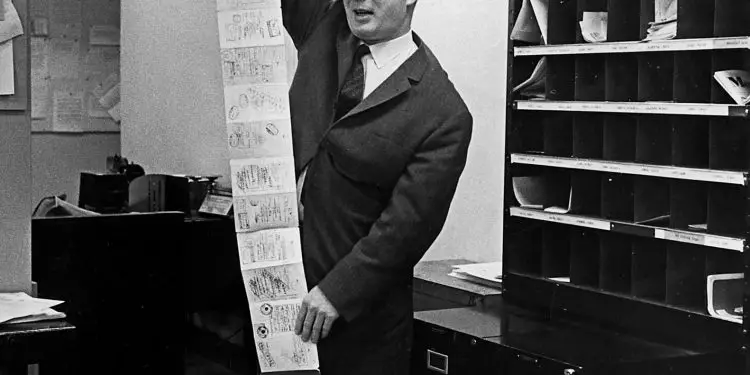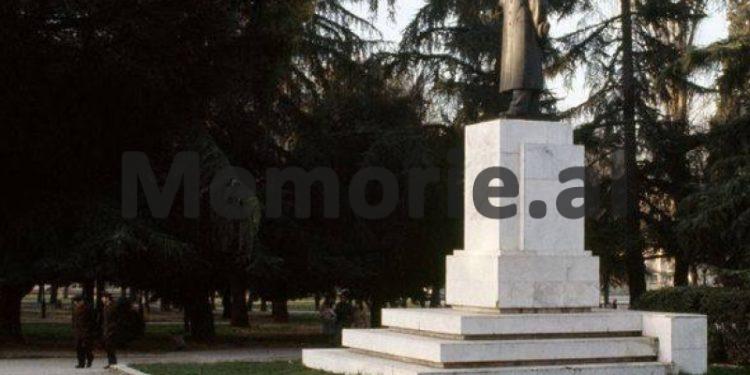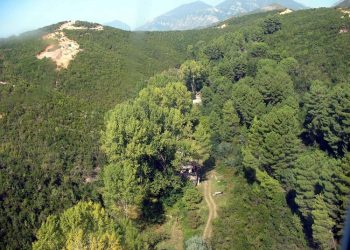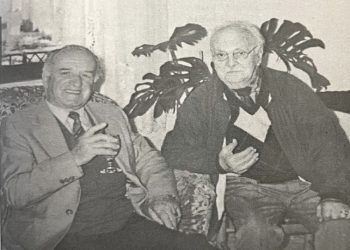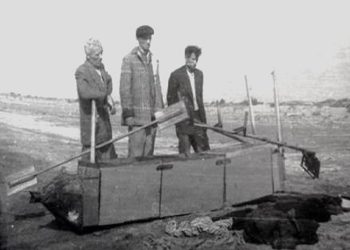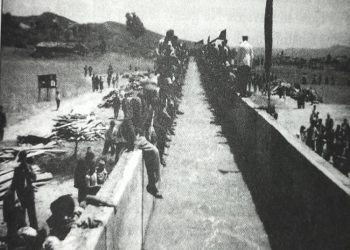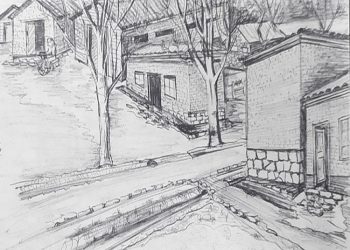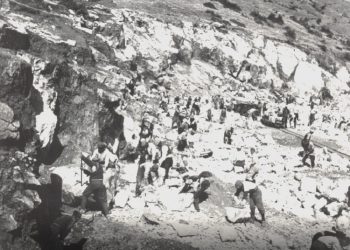By David Binder
– Report prepared by the American journalist, in November 1990, when the city in Central Albania became one of the hotbeds of resistance. Demonstrations and surveillance of foreign journalists. –
Memorie.al / When one of the multitude of foreign vehicles that are allowed to ply in this country passed through this dirty industrial city, people walking on the main road raised their fingers in a V shape. The V sign is one of the ways the truck drivers explained their disdain for the Labor Party, which has ruled the country for the past 46 years and now seems to be losing its grip. In recent months, the people of this city of 20,000 inhabitants, located 18 miles southwest of Tirana, have turned Kavaja into a hotbed of anti-communist demonstrations.
Shootings and lynchings
There were protests in March, June, and again in July 1990. The July demonstration, attended by 5-10 thousand people according to one local youth, marked an increase in violence, with one man shot dead by security forces and a police officer was killed by the mob.
“Citizens of Kavaja hate communists,” said a young man. Since the beginning of January, there have been demonstrations and other larger clashes in the northern city of Shkodra and in the capital (Tirana).
Taken together, in the view of the Albanians and the few Western diplomats accredited here, these events involve Albania, on the path taken in 1989 by other Eastern European countries, which are on the verge of collapse, with governments their communist.
In contrast to the circumstances in other countries, Albania is now involved in unprecedented steps, with a deterioration of the economy, with a decrease in consumer goods and, in these last four months, with a visible fear of the people, for increasing of the security forces, called “State Security”
The process of democratization
Since last spring, the government of President Ramiz Alia, who also heads the Communist Party, formally known as the Albanian Labor Party, has been trying to hold the line with a measured and gradual program of political measures. and economic, known as “democratization” in the poorest country in Europe.
Farmers who used to gather in cooperatives with 30-50 employees are now allowed to cultivate on private plots of land and sell vegetables and meat in open markets. For the first time, citizens have been allowed to travel anywhere and in the last four months, more than 25 thousand people have fled, the majority of them, deliberately, have left Albania, not to return .
According to the official decree, people are allowed to follow religious rites, privately in their homes, a freedom that was prohibited when the government had declared Albania an atheist state and had closed all churches and mosques since 1967.
Here in Kavaje, Christians have begun to warn of public protests, since the beginning of last summer and during the July demonstration, they issued anti-communist slogans against State Security officers who had infiltrated the ranks of the protesters, obstructing those who were in charge of movement.
The place of contradictions
From its high mountains, which cover 2/3 of the earth, to the narrow plains along the Adriatic coast, Albania in the fall of 1990 was a country of many sharp social contrasts, even contradictions:
“In the fields, where there are no agricultural machines, women work with hand tools, such as shovels and picks, while in the Dajti hotel in the capital, there is now a credit card machine and a fax machine.
At “Enver Hoxha” University in Tirana, a disco offers music every Saturday evening, while students are still instructed with a communist education, based on Stalin’s principles. According to a judgment based on a number of honest conversations, many, perhaps most of the 4,000 students, want to leave Albania.
There were still students who had fully and convincingly mastered the entire line of the Communist Party, which they expressed to foreigners that; “Marx, Lenin and Stalin are one” A statue of Stalin still stands on the main street of Tirana.
A painting of Stalin dominates the main square of the mountain town of Puka. There is a town here named after him. But the Stalin sculpture, which stood in the lower part of the city of Shkodra, was moved by communist authorities last summer after protesters dismantled it in a January demonstration.
State of Human Rights
The situation of human rights in Albania is also presented with contrasts, although the government has asked to be admitted to the Conference on Security and Cooperation in Europe.
While at the beginning of this year, thousands of citizens who were interned in different rural areas for various violations and many others who were held as political prisoners, have now been released, while the government has held only 80 political prisoners.
Among the convicts are said to be the former Minister of Foreign Trade, Kiço Ngjela and his son, Spartaku, who were arrested in 1976 and held in a camp called “Kosova”.
The Albanian contradictions have also been increased by the leadership under the direction of President Alia, who had a firm position in his principles: on one side of “our socialist ideal” and on the other side, his desire for “the deepest possible democracy”, a market economy and close ties with Western Europe and the United States.
“We are confused and frustrated, but we are less afraid”, – says a young engineer from Shkodra, who answers about the reform program launched by Mr. Alia. “All of us young people want to be saved.”
Going out
Indeed, over 25,000 people have left legally with passports and visas, and another 5,000 won the right to travel abroad in early July by forcing their way into Western embassies and receiving asylum. A large number of Albanians have illegally crossed the borders of their Yugoslav and Greek neighbors in recent months.
According to a researcher from Tirana, at least 50 people who tried to cross the border were “confirmed killed” by the soldiers last year, but he says that; “the current number may be higher than 300-400 people”.
It is not yet clear if it is shot to kill, despite the changes made, but a four-year-old girl was shot dead during an open escape of about 19 Albanians who were passing through Lake Shkodra in Yugoslavia in the summer past, from a military command.
None of these events have been mentioned in the only Albanian press and television, strictly controlled by the state. The current confusion in the government’s handling of the security situation has been mentioned by several foreign correspondents who visited Kavaja this past afternoon.
The issuance of visas will apparently allow more and more freedom of movement in Albania, for 10 or more days. They can visit any city they want and can leave the country, whenever they want, at the most convenient moment.
The correspondents stopped in Durrës, then continued in the direction of Tirana, from “Rruga e Kavaja”, 10 miles to the south. A few minutes later, they found themselves in Kavaja, when suddenly four cars with civilian and uniformed police officers appeared. Journalists were in a row, in the direction of the prison and the internment camp.
All the citizens present at one time persuaded the policemen to allow the correspondents to continue their journey, with the warning that such actions should not be repeated, which lead to the change of their route. According to a citizen, “Kavaja looked like a place under the surveillance of the Security, since a few weeks ago”.
“They hate, especially Enver Hoxha”
The position of President Ramiz Alia is not clear these days in Albania. His predecessor, Enver Hoxha, who died in 1985, was “treated as a supernatural power, in his last years”, – said today a ship technician in the city of Durrës. Now people raise slogans against Hoxha and his widow, Nexhmija, in Kavaja and in Tirana. Especially in Kavaje, they hate Hoxha.
Even Mr. Alia was not honored here, although some Albanians spoke with a level of respect and affection for him. He does not promote any similar cult of the personality of Enver Hoxha. A technician from Durrës says, referring to Xhelil Gjon, a hard-line member of the Communist Political Bureau and a party secretary, that; “A lot of people blame John for the violence here, but he says it’s Alia herself. He is on duty.”
President Alia, is described by a Western ambassador who has talked to him for a long time, as a; “a man of personal courage and self-restraint and seems very relaxed.” Also, he is a man with a considerable appearance, which he showed when greeting a group of foreign journalists at the end of October.
But also, he will appear as a trainer who “rides” a tiger, who helped him to be educated as a young communist activist and then to shine, in his full development. Now, the “tiger” is moving at a pace that Mr. Alia can no longer fully control, and reliably, he will release it, softening it a bit, but not washing it.
The case of Romania
Romania often appears in the conversations these days in Tirana and other cities, where Albanians discuss the last worst scenario, of the rule of communism in their country, which means a strong popular uprising against the dictatorship, with a lot of bloodshed, as it happened last December in Bucharest.
“We will not allow ourselves to have a Romania here”, says a student in Tirana, who voluntarily accompanies foreign visitors. “Because we are hot-blooded people and here, there will be a massacre”, – he answers. Memorie.al
The article was published in the “New York Times” on November 5, 1990
The title is editorial
Prepared for publication, Albert Gjoka




